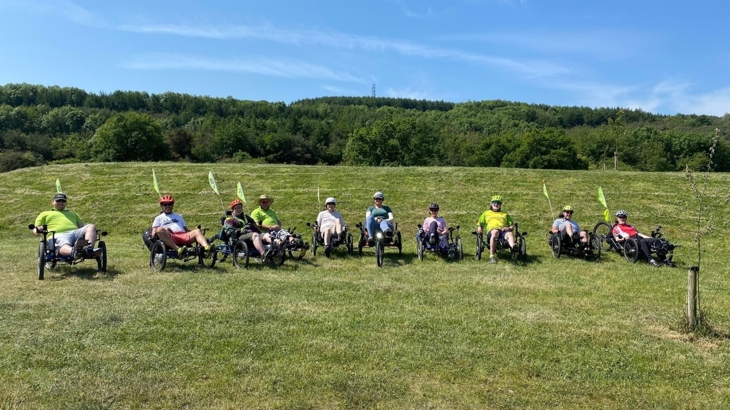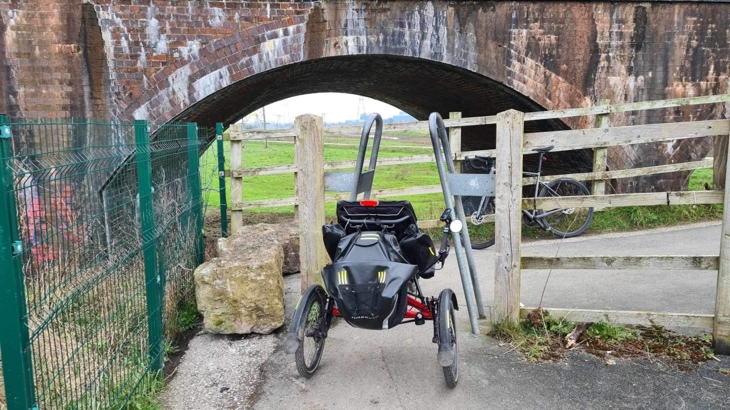Debbie is an RAF veteran who grew up in Flintshire. She discovered recumbent trikes as a means of helping manage her health conditions and enabling her to enjoy exploring through cycling. Despite the positives of her recumbent trike, access barriers mean that she and others often can’t go where others can.

Debbie on her recumbent trike, which has helped her to maintain being active, on the Swansea Bay cycle path.
Hello, I’m Debbie, and I’m an accessible cyclist.
This means I ride a recumbent e-trike instead of a regular bicycle, due to disability.
I started to ride recumbent trikes after realising I could no longer ride a two-wheeled bicycle.
I’ve always struggled with balance when riding a bicycle and even fallen over a few times.
Health conditions have had an impact
In my 40s, things got a lot worse with me developing arthritis and other health issues.
I was eventually diagnosed with hypermobile Ehlers-Danlos syndrome and dyspraxia.
This means I live with chronic pain, fatigue, GI problems, and coordination difficulties, and is a form of neurodivergence.
These diagnoses made sense of my struggles in life and feeling a sense of difference that I couldn’t quite explain.
I got quite depressed about being unwell and not being able to ride a bike due to injury was part of the issue.
I remembered seeing recumbents in Germany when I served with the RAF and started researching what these machines were and discovered accessible cycling really was a possibility.
Accessibility organisations enabling me to cycle again
I found a local charity existed near my home in Gloucestershire to provide accessible cycling for disabled people and went along to try a trike.
It was run by a physiotherapist who saw how accessible cycling really helped people with injuries and disabilities to recover and exercise in a fun way.
The Wheels for All charity ran sessions at an athletic track and also in the Forest of Dean.
Being able to cycle in nature really helped me with my depression because walking was very painful.
Suddenly I felt more capable and that really helped lift my mood.
Over the Covid crisis, I was offered a trike on loan for three months and this proved incredibly helpful.
I had the freedom to exercise in a way that didn’t cause me more harm and actually allowed me to build up at my own pace.
Alongside that, I discovered new friends and developed new skills.

Finding a group of fellow recumbent trike users has helped Debbie with her recovery and sharing experiences.
Travelling independently isn’t without its frustrations
Eventually, I progressed to having my own trike which had e-assist.
Electric assist means I’m still pedalling but can manage hills and go longer distances – the trike is a hefty 35kg, so I’m definitely not cheating!
I’ve started going on longer rides and one of the early rides was with my brother, a keen two-wheel cyclist.
We decided to do the cycle path from Connah’s Quay: one of his favourite rides crossing the River Dee and cycling along the path through the marshes to Net’s Café, a popular stop for cyclists on the Wirral peninsula.
The route is currently hampered by two A-frame barriers that prevent me from using the path independently.
There are two at the Connah’s Quay end and one at the access to the Dee Bridge crossing.
I’ve coped so far by having my brother with me and asking for the help of other cyclists to lift my trike over the barrier.

An example of Debbie trying to negotiate one of the A-frame barriers with her trike.
Barriers mean some can’t go where others can
I’m really hoping that these barriers can be removed or changed to something that allows me access without needing to lift my trike.
Not only do these barriers stop me and other recumbent trike riders using this path, but also people riding with children in cycle trailers, people walking with double buggies, and people using wheelchairs or mobility scooters.
All of us are legitimate and sometimes vulnerable path users who are being blocked from accessing a cycle path, a wonderful community asset that should be available to all.
This is a time when we are being encouraged to get more exercise.
Cycling, wheeling, and walking are fantastic form of exercise, recreation, and means of transport.
I believe making these paths accessible for families and disabled people is vitally important for health, well-being, and the environment.
I’m a part of a number of cycling groups for recumbent riders.
We are living with disability, but our trike riding allows us to maintain strength and fitness in a way that reduces risk of injury.
It gives us a way to access places we can’t get to any other way and have a community where we can share fun, knowledge, and resources.
I’d love to organise a group ride from Connah’s Quay to Chester or Net’s Café, but that will continue to be impossible until these barriers are removed or changed.





